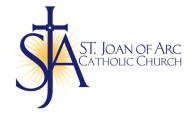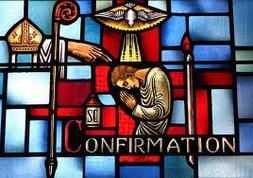What is Confirmation?
Growth is vital to human life; the body and mind must grow to stay alive. Catholics believe that the soul also needs to grow to maturity in the life of grace, just as the human body must grow through childhood, adolescence, and adulthood. Catholics believe the Sacrament of Confirmation is the supernatural equivalent of the growth process on the natural level. It builds on what was begun in Baptism and what was nourished in Holy Eucharist. It completes the process of initiation into the Christian community, and it matures the soul for the work ahead.
What Occurs During a Catholic Confirmation?
The Holy Spirit is first introduced to a Catholic the day that she's baptized, because the entire Holy Trinity — Father, Son, and Holy Spirit — are invoked at the ceremony. During Confirmation, God the Holy Spirit comes upon the person, accompanied by God the Father and God the Son, just as he did at Pentecost.
This sacrament is called Confirmation because the faith given in Baptism is now confirmed and made strong. Sometimes, those who benefit from Confirmation are referred to as soldiers of Christ. This isn't a military designation but a spiritual duty to fight the war between good and evil, light and darkness — a war between the human race and all the powers of hell.
Confirmation means accepting responsibility for your faith and destiny. Childhood is a time when you're told what to do, and you react positively to reward and negatively to punishment. Adulthood, even young adulthood, means that you must do what's right on your own, not for the recognition or reward but merely because it's the right thing to do. The focus is on the Holy Spirit, who confirmed the apostles on Pentecost (Acts 2:1–4) and gave them courage to practice their faith. Catholics believe that the same Holy Spirit confirms Catholics during the Sacrament of Confirmation and gives them the same gifts and fruits.
Normally, only the bishop confirms the Catholics in his diocese. However, priests can be delegated to confirm adult converts from other religions when they're brought into full communion with the Roman Catholic Church at the Easter Vigil and they've attended the Rite of Christian Initiation of Adults (RCIA) program in the parish. Non-Catholics who are interested in the Catholic faith and converting to Catholicism attend RCIA classes.
Growth is vital to human life; the body and mind must grow to stay alive. Catholics believe that the soul also needs to grow to maturity in the life of grace, just as the human body must grow through childhood, adolescence, and adulthood. Catholics believe the Sacrament of Confirmation is the supernatural equivalent of the growth process on the natural level. It builds on what was begun in Baptism and what was nourished in Holy Eucharist. It completes the process of initiation into the Christian community, and it matures the soul for the work ahead.
What Occurs During a Catholic Confirmation?
The Holy Spirit is first introduced to a Catholic the day that she's baptized, because the entire Holy Trinity — Father, Son, and Holy Spirit — are invoked at the ceremony. During Confirmation, God the Holy Spirit comes upon the person, accompanied by God the Father and God the Son, just as he did at Pentecost.
This sacrament is called Confirmation because the faith given in Baptism is now confirmed and made strong. Sometimes, those who benefit from Confirmation are referred to as soldiers of Christ. This isn't a military designation but a spiritual duty to fight the war between good and evil, light and darkness — a war between the human race and all the powers of hell.
Confirmation means accepting responsibility for your faith and destiny. Childhood is a time when you're told what to do, and you react positively to reward and negatively to punishment. Adulthood, even young adulthood, means that you must do what's right on your own, not for the recognition or reward but merely because it's the right thing to do. The focus is on the Holy Spirit, who confirmed the apostles on Pentecost (Acts 2:1–4) and gave them courage to practice their faith. Catholics believe that the same Holy Spirit confirms Catholics during the Sacrament of Confirmation and gives them the same gifts and fruits.
- Each individual to be confirmed comes forward with his sponsor. At Baptism, Junior's mom and dad picked his godfather and godmother; for Confirmation, he picks his own sponsor. The same canonical requirements for being a sponsor in Baptism apply for sponsors at Confirmation. The sponsor can be the godmother or godfather if they're still practicing Catholics, or he may choose someone else (other than his parents) who's over the age of 16, already confirmed, and in good standing with the Church. One sponsor is chosen for Confirmation. (Most people have two sponsors, one godparent of each gender, for Baptism.)
- Each Catholic can select his own Confirmation name. At Baptism, the name was chosen without the child's consent because the child was too little to make the selection alone. Now, in Confirmation, another name — in addition to the first and middle names — can be added, or the original baptismal name may be used. It must be a Christian name, though, such as one of the canonized saints of the Church or a hero from the Bible. You wouldn't want to pick a name like Cain, Judas, or Herod, for example, and no secular names would be appropriate.
- The Catholic being confirmed stands or kneels before the bishop, and the sponsor lays one hand on the shoulder of the one being confirmed. The Confirmation name is spoken, and the bishop puts Chrism Oil on the person's forehead, says his name aloud, and then says, "Be sealed with the gift of the Holy Spirit." The person responds, "Amen." The bishop then says, "Peace be with you." And the person responds, "And with your spirit" or "And also with you."
Normally, only the bishop confirms the Catholics in his diocese. However, priests can be delegated to confirm adult converts from other religions when they're brought into full communion with the Roman Catholic Church at the Easter Vigil and they've attended the Rite of Christian Initiation of Adults (RCIA) program in the parish. Non-Catholics who are interested in the Catholic faith and converting to Catholicism attend RCIA classes.
Eligibility For Confirmation Sponsor
- Must be 16 years of age or older
- Have received the Sacraments of Initiation; namely Baptism, Confirmation and the Eucharist.
- If married, your marriage must have been witnessed by a Catholic priest or special exception approved by the Archbishop.
- Presently active in the practice of the faith by regularly attending Mass on Sunday and Holy Days of Obligation and receiving the sacraments of Reconciliation and Eucharist frequently.
If you intend to be a Confirmation Sponsor:
If you ARE a parishioner of St. Joan of Arc - Print the form, complete and sign it, bring it to the parish office.
If you ARE NOT a parishioner of St. Joan of Arc - You may complete the form and have the Pastor from your parish sign and seal. Once the form is completed, please drop it off in the parish office or send it to the address below. If your parish has a different form for eligibility, that can be used in place of this form.
Please return all forms to the parish office at:
St. Joan of Arc Church
359 W. Areba Ave.
Hershey, PA 17033
If you ARE a parishioner of St. Joan of Arc - Print the form, complete and sign it, bring it to the parish office.
If you ARE NOT a parishioner of St. Joan of Arc - You may complete the form and have the Pastor from your parish sign and seal. Once the form is completed, please drop it off in the parish office or send it to the address below. If your parish has a different form for eligibility, that can be used in place of this form.
Please return all forms to the parish office at:
St. Joan of Arc Church
359 W. Areba Ave.
Hershey, PA 17033
Confirmation Eligibility Form
| confirmation_sponsorship_eligibility_2018_rev.pdf |





